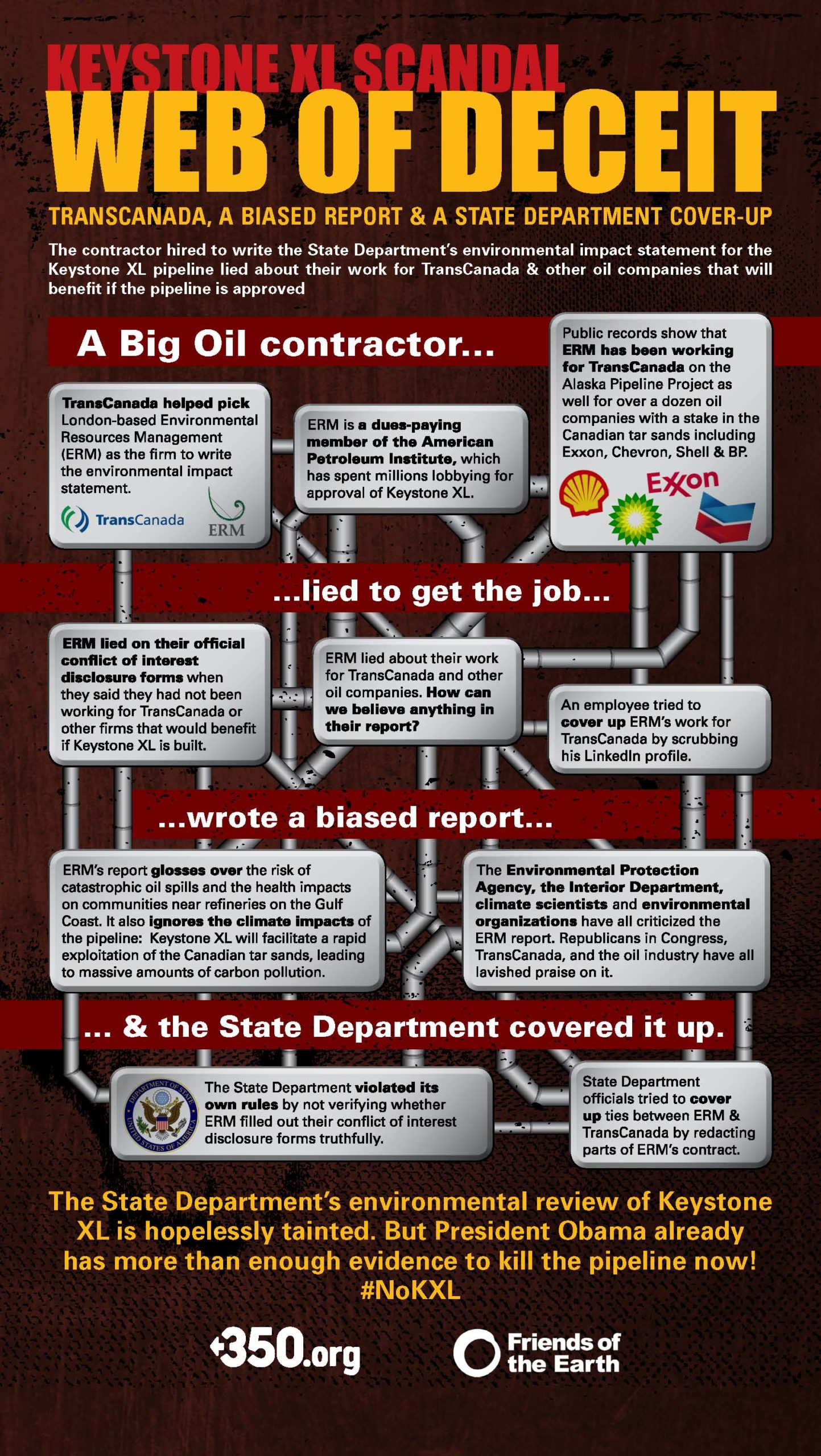The State Department’s Office of the Inspector General (OIG) has finally weighed in on potential conflicts of interest in the environmental assessments of the proposed Keystone XL pipeline. Sort of.
The office just released its long-anticipated report, capping off an investigation on whether Environmental Resources Management, the contractor hired by TransCanada to conduct the environmental impact study, had too close a relationship with TransCanada, and whether it deliberately hid those ties in filings with the State Department.
Specifically, from the OIG‘s findings:
- OIG did find that the process for documenting the contractor selection process, including the conflict of interest review, can be improved.
- OIG also found that the Department’s public disclosures concerning its conflict of interest review could be improved.
Finally, the Office of the Inspector General makes these specific recommendations:
- OIG recommends that the Department’s Bureau of Oceans and International Environmental and Scientific Affairs, in coordination with the Office of the Legal Adviser, enhance its guidance to more fully articulate its selection and conflict of interest review processes.
- OIG recommends that the Department explain in greater detail the definition of “organizational conflict of interest” relied upon by the Department.
- OIG recommends that the Department specify in its guidance the documentation required in the contractor selection and conflict of interest processes and establish standard operating procedures to capture and retain this information.
- OIG recommends that the Department enhance its guidance to integrate a process for public disclosure of
appropriate information.
Attention will now turn to the Government Accountability Office, which will begin an investigation on the State Department’s environmental review process. Earlier this week, Representative Raúl Grijalva of Arizona requested a GAO review, suggesting that the Keystone XL environmental assessment has been corrupted by conflicts of interest. “Nothing should be glossed over; nothing should be ignored,” Grijalva said. “The questions that we posed to GAO had to do with the State Department process. And if this is a tainted process, I suggest the president at that point shouldn’t trust that information,”
DeSmogBlog will take a closer look at all the details in the report and update this post throughout the evening.
Some background
The State Department is charged with conducting an environmental impact assessment for any permitting decision, like the Keystone XL pipeline. This assessment is presented to the American public as an Environmental Impact Statement. TransCanada nominated a contractor, ERM Group, with a long history of rubber-stamping fossil fuel projects. Related, ERM is a dues-paying member of the American Petroleum Institute (API).
In conflict of interest disclosure forms that ERM submitted to the State Department, the contractor claimed to have no ties to TransCanada. Which wasn’t true. Public records revealed that ERM has worked recently with TransCanada on the Alaska Pipeline Project, and has contracts or recently worked with dozens of other oil companies with major stakes in the mining, transport, and refining of tar sands crude.
According to the Checks and Balances Project, ERM lied at least twice in its filings with the State Department, which should have cast enough doubt on their competency and impartiality to conduct a thorough and unbiased review of the Keystone XL pipeline.
Then, in May of 2013, the State Departments’ Inspector General started an investigation into the seemingly clear conflicts of interest.
In a Friday afternoon “trash dump” before the Super Bowl weekend, the State Department released the Final Supplemental Environmental Impact Statement, which was immediately criticized for being flawed and incomplete. The final environmental assessment was released before this inspector general’s report, despite the pleas of two dozen lawmakers who called for a halt of the State Department’s review until the conflict of interest issues were investigated.
It was hoped by many in the environmental community that the report released today, which was repeatedly delayed, would expose the flawed State Department contracting process, call for a new study that could be free of bias, and call for an overhaul for the procedures that allowed this to take place in the first place. Instead, the narrowly-focused report merely calls out State for weak procedures that “need to be improved.”
Immediate reactions
From 350.org founder Bill McKibben: “The real scandal in Washington is how much is legal. This process has stunk start to finish. It’s good that its now in the hands of the Secretary Kerry and President Obama so there’s at least an outside chance of a decision not based on cronyism.”
From 350.org Policy Director Jason Kowalski: “Far from exonerating the State Department of wrongdoing, the Inspector General report simply concludes that such dirty dealings are business as usual. While allowing a member of the American Petroleum Institute to review a tar sands oil pipeline may technically be legal, it’s by no means responsible. Secretary Kerry and President Obama can let their climate legacies be tarred by this dirty process or they can do the right thing and reject the Keystone XL pipeline once and for all.”
350.org has announced an “XL Dissent” weekend of action in Washington DC this Saturday and Sunday, capped off by a rally at Secretary of State John Kerry’s Washington residence and a march to the White House. Find more details about the actions at 350.org.
From Elijah Zarlin, CREDO‘s senior campaign manager and formerly a senior national email writer on President Obama’s 2008 campaign: “Secretary of State John Kerry inherited this mess, and now it’s time for him to bring it to a close by stating what is obvious – that this pipeline is not in our national interest. If he doesn’t, more than 78,000 Americas stand ready to risk arrest to stop the White House and the State Department from putting the oil industry’s interest before our national interest, and recommending approval of Keystone XL.”
Statement from Friends of the Earth President Erich Pica:
“This Inspector General Report raises more questions than it answers. In fact it reveals serious errors in the State Department’s process for vetting conflicts of interest. It’s conclusion that the agency followed its procedures, seems to rest mainly on interviews with State Department lawyers who, the report points out, never documented all of the supposed due diligence they were conducting.
There are notable failures in the process, including the fact that ERM only disclosed its relationship with TransCanada after they were awarded the contract; even though conflicts of interest were supposed to be one of the criteria. This is not reassuring, but we’re hopeful that the GAO will get to the bottom of this.
In the meantime, President Obama has more than enough information to deny the pipeline, and we remain confident that he will do so.”
Here is a graphic that 350.org and Friends of the Earth put out previously about the conflicts of interest in the KXL environmental review.

Image credit: Kris Krug
Subscribe to our newsletter
Stay up to date with DeSmog news and alerts







